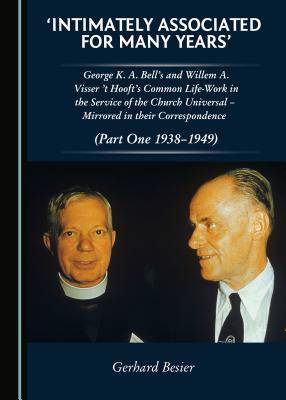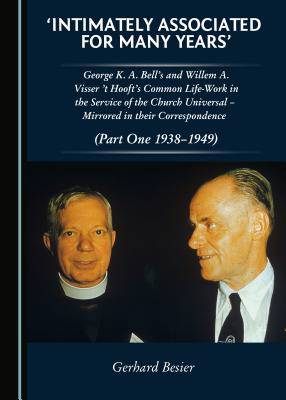
- Afhalen na 1 uur in een winkel met voorraad
- Gratis thuislevering in België vanaf € 30
- Ruim aanbod met 7 miljoen producten
- Afhalen na 1 uur in een winkel met voorraad
- Gratis thuislevering in België vanaf € 30
- Ruim aanbod met 7 miljoen producten
Zoeken
'Intimately Associated for Many Years': George K. A. Bell's and Willem A. Visser't Hooft's Common Life-Work in the Service of the Church Universal  " Mirrored in Their Correspondence (Parts One and Two)
George K. A. Bell's and Willem A. Visser't Hooft's common life-work in the service of the Church Universal - mirrored in their Correspondence (Parts One and Two)
Gerhard Besier, Stokå'osa Katarzyna
Hardcover | Engels
€ 139,95
+ 279 punten
Omschrijving
The Anglican Bishop George Bell (of Chichester) and the General Secretary of the World Council of Churches, Willem A. Visser't Hooft (of Geneva) exchanged hundreds of letters between 1938 and 1958. The correspondence, reproduced and commented upon here, mirrors the efforts made across the ecumenical movement to unite the Christian churches and also to come to terms with an age of international crisis and conflict. In these first decades of the World Council, it was widely felt that the Church could make a noteworthy contribution to the mitigation of political tensions all over the world. That's why Bell and Visser't Hooft talked not only to bishops and the clergy, but also to the prime ministers and presidents of many countries. They raised their voices in memoranda and published their public letters in important newspapers. This was the World Council's most successful period.
Specificaties
Betrokkenen
- Auteur(s):
- Uitgeverij:
Inhoud
- Aantal bladzijden:
- 1191
- Taal:
- Engels
Eigenschappen
- Productcode (EAN):
- 9781443882736
- Verschijningsdatum:
- 1/12/2015
- Uitvoering:
- Hardcover
- Formaat:
- Genaaid
- Afmetingen:
- 148 mm x 212 mm
- Gewicht:
- 86 g

Alleen bij Standaard Boekhandel
+ 279 punten op je klantenkaart van Standaard Boekhandel
Beoordelingen
We publiceren alleen reviews die voldoen aan de voorwaarden voor reviews. Bekijk onze voorwaarden voor reviews.











